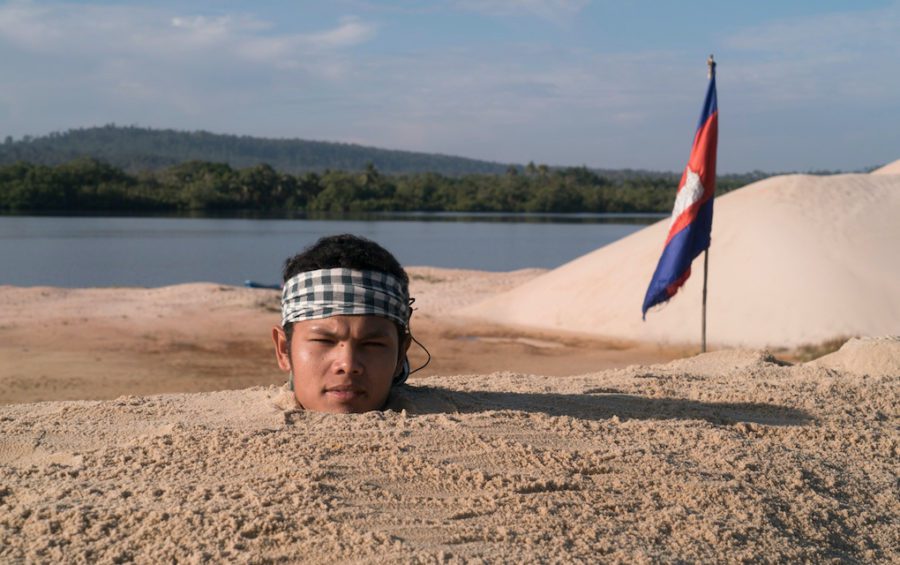Tempers flared as Thun Ratha took the stand.
The jailed Mother Nature environmentalist, convicted of incitement and now awaiting trial for plotting, is accused of working against the state with videos asking questions of landfilling, sewage discharges, sand dredging and associated corruption.
On Tuesday he was brought to the Appeal Court in Phnom Penh in his orange prison jumpsuit, a hearing to appeal against his incitement conviction at the Phnom Penh Municipal Court in May, when he was handed a 20-month jail sentence and a $1,000 fine.
From his first answers, he was repeatedly cut off. Asked why he did not accept the municipal court decision, he said all he had done was protect natural resources, then criticized the courts and government as unjust. Judge Yon Narong told him to stick to the case.
As prosecutor Chum Sensathea began his questioning, both Ratha and Sensathea’s voices grew louder. Sensathea pressed Ratha about the content of his videos, asking why he was vague about them.
Ratha said he couldn’t remember because he had been in an overcrowded jail without enough to eat for over a year. He told the prosecutor: You have never been in prison. You will never know what it’s like living in prison.
Sensathea warned Ratha that he was insulting the court. They continued to exchange heated words as judge Narong stepped in, telling Ratha five times to calm down and asking if he had any issues.
“I do not have any problem. I am OK,” Ratha answered.
His defiance has continued since his arrest despite a new charge — plotting, which carries five to 10 years of potential jail time — being brought against him in July.
Ratha was arrested in September last year alongside fellow Mother Nature activists Long Kunthea and Phuon Keoreaksmey, who were also convicted for incitement in May.
Three other members, Sun Ratha, Yim Leanghy and Ly Chandaravuth, were further arrested in June. The government has claimed that their environmentalism is just a front for attacking the state, but civil society and foreign embassies have decried the actions against the young activists.
The U.N.’s OHCHR, U.S. and E.U. monitors were present at the Appeal Court on Tuesday.
Under questioning from defense lawyer Sam Chamroeun, Ratha continued the defense of his activities. He had frequently raised questions in Mother Nature videos about the gap between the law and the actions of officials, he said.
He was helping the government to see what was rotten so they could cut it off, he said of his motivations for producing environmental videos.
“Through this, we hope that it will reach their ears and eyes,” he said.
The court should release him so he can see his wife again, and it should stop punishing young people trying to protect nature for the next generation, he said.
“I did not have any intention to incite chaos in society. … I just gave the true information and helped the government to earn their votes,” he said. “I should not be sentenced for 20 months and fined. It is unacceptable.”
What the group did was for the public interest, not politics, he added. He asked for a meeting with Prime Minister Hun Sen so he could explain the truth of the situation.
“We are the enemies of environmental destruction,” he said.
Kunthea was the next to take the stand. Questioning focused on what she was doing around the time of her arrest in September last year.
She had planned and announced a one-person march from Wat Phnom to Hun Sen’s house to raise awareness about Boeng Tamok lake, which is facing rapid infilling and being transferred piecemeal to private interests.
She planned to wear white, like a nun, to represent nature, Kunthea told the court on Tuesday. “Nature is alive too, like human beings,” she said.
She wanted to inform Hun Sen about her concerns, she said.
She then recalled her arrest. A group of six people — in a car and on two motorbikes — dragged her away while she was eating breakfast outside, she said.
“They arrested me like I was a robber. I shouted: robber,” Kunthea said.
Keoreaksmey, the third defendant, said she had been dragged away alongside Kunthea. The officers told them nothing at the time, she said.
She said she loved the environment. The computer science student said she wanted to get back to her studies.
“I am not a storm causing any issues,” she said.
The prosecution asked for the lower court’s verdict to be upheld, though they said they had revised the starting period of the three activists’ crimes from 2013 to 2017.
A judgment is expected on November 5.
The case against Ratha, Kunthea and Keoreaksmey is among dozens brought against activists, whether political or environmental. Another prominent case currently before the courts is of a 16-year-old autistic boy, the son of a jailed opposition politician, jailed for incitement and insult. U.N. representatives have stated they are “deeply disturbed” by the case against the minor.
In the U.N.’s correspondence with the government publicly released on Tuesday, the representatives asked the government for clarification on how the teenager’s arrest was not a violation of international human rights standards.
The government’s response said: The teenager “had been using Telegram and Facebook to distribute and publish information publicly, which not only insulted and undermined the dignity of the leaders but also incited serious chaos in the society as a whole.”
“Consistency in the above-mentioned facts and supporting evidences collected proves that the act of [redacted] is a criminal offense.”













